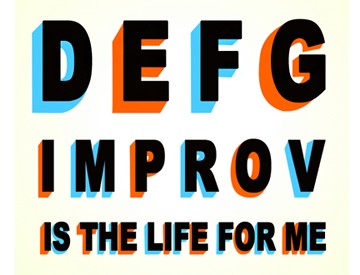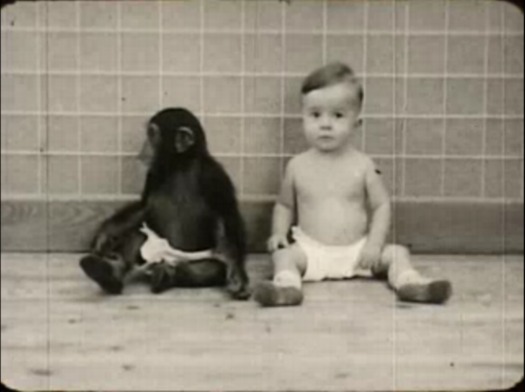Feature Article: Forever Neotenic
by Shana Merlin
A lot of my students say they love class because it’s like being a kid again. They feel more playful and imaginative. They get silly and giggly. Feeling child-like (and not childish) can be a great benefit of practicing improv. But it goes beyond playing schoolyard games and making up fairy tale stories.
My students are on to something deeper when they say improvising is like being a kid. It’s something I read about in the second half of the book that I featured in an earlier newsletter,Play: How It Shapes the Brain, Opens the Imagination, and Invigorates the Soul by Stuart Brown. It’s the concept of neoteny: maintaining youthful characteristics throughout adulthood. I’m not talking about a keeping slender figure and eliminating crow’s feet. Neoteny enables your mind to remain “plastic” as you age. Creatures that are neotenic exhibit an “extended openness to change, and sustained curiosity, as well as the ability to readily incorporate new information” according to Brown. Your mind is continually growing and adapting. You remain inquisitive and try to figure things out. There’s exploration and discovery throughout adulthood and into old age. And this is something among primates that is unique to humans.
Brown compares humans to chimpanzees as they grow from being babies to adults. Chimp babies and human babies actually look a lot alike, with high rounded foreheads and big eyes. As chimpanzees get older they start to resemble our Neanderthal ancestors with their sloped forehead and heavy brow ridges. Their behavior starts to get more rigid along with their shape. They stop playing so much, have a strong social hierarchy, and they spend their time mostly in productive purposeful pursuits. Human babies, on the other hand, grow into adults that maintain a lot of the baby-like attributes, with large heads, a flatter face, not too much hair, and so on. Humans retain a lot of child-like qualities for their entire lives. The brain is able to repair itself after damage. We are able to adjust to new circumstances and adapt. We can keep learning new skills and playing well into advanced age.
But what is the evolutionary benefit of all this neoteny? Because humans maintain some juvenile characteristics, we are able to adapt to live in different environments and circumstances. We are more able to be creative. It enables us to have successful social groups and interaction. It would not be a stretch to say that neoteny is partially responsible for many of the great accomplishments of man: civilization and the arts. Of course both neoteny and maturity have their advantages and disadvantages. Brown writes, “Neoteny tends to be more flexible but vulnerable, while maturity is stronger but more rigid or brittle.”
And just like many things in life, there seems to be a use it or lose it aspect to neoteny. The way to hold on to your flexibility and creativity is to play. According to Brown, “We are designed by nature and evolution to continue playing throughout life. Life-long play is central to our continued well being, adaptation, and social cohesiveness.” Almost weekly I read of some new study that says playing bridge or doing crosswords helps extend and improve people’s quality of life.
For me, doing improv is my supplemental health insurance, in case Obama’s health care plan doesn’t work out. I meet veteran improvisers who have been playing 20+ years and they all seem so sharp, so alive, and so young. I hope I can be like that in another 15 years of improv. I think the daily playing, socializing, and hearty laughing is a good plan for just that.
The bottom line is that play is good for you. And play can be a lot of things: sports, video games, doing make believe with your kids, improv, or any creative pursuit. Just as long as you do it for fun. So play long and prosper.
Shana Merlin
Founder, Merlin Works



